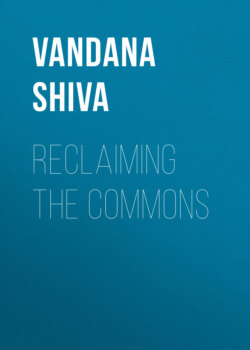Читать книгу Reclaiming the Commons - Vandana Shiva - Страница 19
На сайте Литреса книга снята с продажи.
Defending the Biodiversity and Knowledge Commons: Navdanya’s Community Biodiversity Register (CBR)
ОглавлениеWhile we worked on laws to protect our biodiversity, we also built the movement to defend biodiversity and knowledge commons within communities.
A Community Biodiversity Register performs the function of documenting knowledge of communities at the local, regional, and national levels by the people themselves for the purpose of rejuvenating the ecological basis of agriculture and the economic status of farmers.
CBRs recognize both the differing needs of farmers and consumers as well as their contribution towards meeting these needs. Navdanya has helped form more than 5000 CBRs over the years. CBRs serve the needs of local agricultural communities and not the needs of non-local commercial interests who exploit biodiversity for raw material. Therefore, the documentation has to branch out of local community registers which are ecosystem specific, culture specific, and which are the primary level of utilization for community rejuvenation.
Documenting farmers’ varieties of seed is a vital countervailing force to the predatory nature of the IPR regime because it refutes the terms “landraces” and “germplasm” (both of which contribute to the concept that farmers’ varieties are not gifts of nature, and thus can be appropriated freely for corporate benefit) and invalidates corporate claims to originality and innovation by placing it, beyond doubt, with the farming community. CBRs, by making farmers varieties freely accessible to other farmers across the country, rejuvenate agricultural biodiversity, people’s knowledge, and encourage sustainable agriculture.
Access to traditional varieties revitalizes the role of the farmer as a plant breeder and strengthens his resistance to seed monopolies. Seed exchanges between farmers inevitably shrink the market for corporate seeds. Such exchanges thus help farmers and farming communities to retain agricultural freedom and economic control over agriculture.
At Navdanya, we have been compiling such a community register. Navdanya’s community biodiversity register acts as a document of indigenous resources and indigenous knowledge, as a platform for the assertion of Common Intellectual Rights, and as a seed catalogue for interested individuals and groups to get access to organic seed, the first link in the organic food chain.
Navdanya believes that conservation of agricultural biodiversity is impossible without the participation of the communities who have evolved and protected the plants and animals that form the basis of sustainable agriculture. In agriculture, in situ conservation strategies are impossible to separate from sustainable utilization and production methods.
